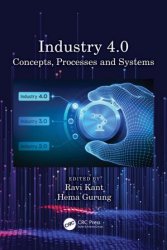Industry 4.0: Concepts, Processes and Systems
- Добавил: literator
- Дата: 15-09-2023, 09:12
- Комментариев: 0
 Название: Industry 4.0: Concepts, Processes and Systems
Название: Industry 4.0: Concepts, Processes and SystemsАвтор: Ravi Kant, Hema Gurung
Издательство: CRC Press
Год: 2024
Страниц: 282
Язык: английский
Формат: pdf (true)
Размер: 27.6 MB
This book presents a comprehensive discussion of the recent advances in Industry 4.0, manufacturing processes, and intelligent techniques. It will serve as an ideal reference text for graduate students and academic researchers in the fields of manufacturing engineering, industrial engineering, mechanical engineering, and production engineering. This text introduces Industry 4.0, its evolution, and essential pillars of Industry 4.0 including calibration, metrology, quality control, robotics, Artificial Intelligence (AI), and the Internet of Things (IoT).
It comprehensively covers important topics including the cold spray technique for additive manufacturing, tool condition monitoring, robotic manipulators, metrology, quality control, and the Internet of Things in Industry 4.0. The fourth industrial revolution is Industry 4.0, also called smart manufacturing and Internet of Things (IoT). It describes the continuous improvement towards automation, interconnectivity, machine learning, and better control over the production process.
Industry 4.0 majorly emphasizes digitalization, automation, and communication. It will enable faster, flexible, efficient, and high-quality low-cost processing in the industries. Machines will be capable of interacting with the operator, designer, quality engineer, distributor, customer, and even with other machines. They will have the capability of self-learning by collecting real time data and storage from the cloud. Connectivity is one of the most important pillars of Industry 4.0 that will improve collaboration and access across departments, partners, vendors, product, and people. Industry 4.0 will offer high flexibility, self-optimization, self-configuration, self-diagnosis, cognition, and intelligent support at different levels. It will provide the advantages of quick response to change in demand, faster innovations, customized production, decentralized production, less defects, and low-cost production.
This book discusses various aspects of Industry 4.0 including the basic principles, framework, components, advantages, challenges, implementation methodology, and future aspects of this industrial revolution. The most important components of Industry 4.0 such as sensors and actuators for the smart machines, machine learning (ML), image processing, blockchain, Artificial Intelligence (AI), Big Data, reconfigurable components, additive manufacturing, and condition monitoring are discussed in this book. It will provide an overall idea of Industry 4.0 especially for the manufacturing sector.
The book:
Discusses additive manufacturing and applications of lasers in advanced manufacturing
Covers sensors, actuators, and calibration techniques for next-generation industries
Emphasizes the recycling of materials for sustainable manufacturing
Explores latest advances in the Internet of Things, robotics, artificial intelligence, and machine learning in view of Industry 4.0
Provides a conceptual framework of Industry 4.0 with the help of applications and case studies
The text is primarily written for graduate students and academic researchers in the fields of manufacturing engineering, industrial engineering, mechanical engineering, and production engineering.
Скачать Industry 4.0: Concepts, Processes and Systems
Внимание
Уважаемый посетитель, Вы зашли на сайт как незарегистрированный пользователь.
Мы рекомендуем Вам зарегистрироваться либо войти на сайт под своим именем.
Уважаемый посетитель, Вы зашли на сайт как незарегистрированный пользователь.
Мы рекомендуем Вам зарегистрироваться либо войти на сайт под своим именем.
Информация
Посетители, находящиеся в группе Гости, не могут оставлять комментарии к данной публикации.
Посетители, находящиеся в группе Гости, не могут оставлять комментарии к данной публикации.
